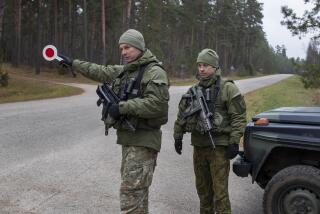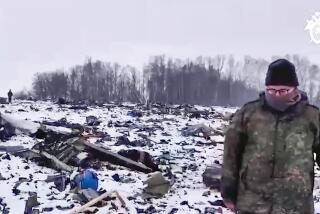Lithuania Gets Control of A-Plant
VILNIUS, Soviet Union — Without any fanfare or press coverage, two deputy ministers of the Soviet Atomic Energy Ministry came to the Lithuanian capital this week to turn over a huge nuclear power station to the Baltic republic.
“Until this week, officials from the Soviet energy ministries talked to me like their underling,” Lithuanian Energy Minister Leonas Asmantas said. “But when they came this time, we talked like officials of two friendly countries. It is amazing how quickly their attitude changed.”
The transfer of the giant Ignalina atomic energy power plant from Soviet to Lithuanian ownership was hardly noticed here in the Lithuanian capital during a week of visits by foreign dignitaries, whose countries have just recognized the statehood of the Baltic republics.
But it was an important sign from Soviet authorities that they, too, no longer consider Lithuania theirs.
Although the Soviet Union has not officially recognized the Baltic republics’ independence, Russia and several other Soviet republics have. Lithuania still faces complicated negotiations on practical aspects of divorcing itself from the Soviet Union.
But this week will go down in local history books as a time of unprecedented strides toward freedom.
Ironically, the Kremlin putsch, staged by hard-liners to prevent the breakup of the Soviet empire, actually propelled Lithuania and its two fellow Baltic states, Latvia and Estonia, toward their goal of complete independence.
“We were accustomed to fighting long and hard for every step we made toward independence, but now, all of a sudden, we have surged the rest of the way down the path without any effort,” said Elena Leontjeva, an economist. “For almost two years, we begged other countries to help us by recognizing our statehood, but now dozens of countries have recognized us all at once.”
Moscow’s role in separation talks with the Baltic states changed almost overnight from that of a jealous husband, who refuses to let his wife go no matter how desperately she struggles, to that of a defeated man, who not only lets his spouse leave but gives her everything she wants.
After months of tedious, slow negotiations with the Soviet Union over how to separate Lithuania from the country it had been part of for half a century, the Soviet side appears to have given in on most of the disputed points in the settlement.
In only a few days, Moscow handed Lithuania control of its own borders and customs posts, agreed to transfer Soviet-owned plants to Lithuanian jurisdiction and even promised to start negotiations on pulling the Red Army out of the Baltic state.
But fundamental obstacles to a completely free Lithuania still remain. Although discussions are moving ahead on turning over some military facilities to Lithuania, a state with a population of only 3.8 million, Moscow has not yet sent a representative to Vilnius with the authority to negotiate the withdrawal of the tens of thousands of Soviet troops in this tiny republic--by some estimates in excess of 100,000 soldiers.
“So far, we have received no assurances about a troop pullout,” said Audrius Butkevicius, director of Lithuania’s National Defense Department. “We have talked only to military officials without the authority to call for a troop withdrawal.”
The notorious “black beret” Soviet Interior Ministry troops, who Lithuanian officials believe are responsible for dozens of “terrorist” attacks on its customs posts, have resisted orders from the Lithuanian government that they immediately give up their weapons and disband.
But parliamentary spokesman Audrius Azubalis told reporters Friday that the problem with the black beret commandos “would be resolved within three days.” Indeed, later in the day, the Soviet Interior Ministry ordered its troops to disband, and the Associated Press reported that 80 of them had departed their stations, while others were staying at the Vilnius base until they receive specifics on when and how to leave the republic.
In a strange twist, some black beret troops have asked for asylum with their families in a Western country, saying that they fear a “new stage of repression,” the official news agency Tass reported.
Separating Lithuania from the Soviet Union economically is also a complicated task, but there has been significant progress made in the last 10 days.
Russian Federation President Boris N. Yeltsin decreed, after the coup was put down, that Soviet-owned industry in Lithuania would be transferred immediately to Lithuanian jurisdiction. Most plants and factories here have already confirmed their compliance with this order.
Soviet Atomic Ministry officials traveled to Vilnius to negotiate the transfer to Lithuanian jurisdiction of the Ignalina nuclear power station, about 100 miles southwest of Vilnius. It produces about two-thirds of the electricity generated in Lithuania.
Although Lithuania exports about half the electric power it produces, and most of the electricity from the Ignalina plant is used by other republics, the visiting officials did not even put up a fight to retain the facility as Soviet property.
“They acknowledged that it was under our jurisdiction and signed an agreement on cooperation,” said Energy Minister Asmantas.
But other economic issues have been stickier. Lithuania’s banking system, which is integrated with the Soviet system and centered in Moscow, still stands as a barrier to full economic freedom.
Lithuanian officials are eager to move forward with negotiations so that they can control their own money flows and introduce their own currency. But the officials with whom they began negotiations lost their jobs in the wake of the failed coup.
“We do not know whom to deal with. Old officials are gone and we do not know who is really in charge--the Russians or Soviets,” said Eugenijus Maldeikis, head of the Lithuanian Economic Ministry’s department on strategy and reform. “This is stalling our attempts to introduce our own currency.”
Maldeikis’ complaint about how chaos in Moscow these days has confused negotiations on separation was repeated by many Lithuanian officials. While expressing frustration about the turmoil, a hint of satisfaction that Lithuania had outlived the Soviet empire was evident in their voices.
“No one knows what the Soviet Union is as a country any more,” said Aleksandras Abisala, Lithuania’s minister in charge of negotiations with Moscow. “This creates a real problem when we’re trying to negotiate with the Soviet Union about our independence.
“When they create some kind of country and form a central government, we will negotiate with them and we will establish diplomatic relations with them like we have with other countries. Right now, all we can do is talk with various ministries, but who knows whether they will still have any authority by the time the negotiations are finished,” Abisala said.
He said Lithuanians do not consider Moscow’s changed attitude toward the republic’s independence a gift: “I think we suffered enough for it over the last 51 years.”
Lithuania was annexed under secret terms of the Nazi-Soviet pact in 1939 and invaded by the Red Army a year later.
About 460,000 Lithuanians--roughly a sixth of the population--were reportedly killed, deported or arrested during the Stalinist years. The Lithuanians’ yearnings for freedom from the Kremlin were kept in check by the totalitarian Soviet system until about three years ago.
Since then, Lithuanians have struggled openly for their independence. The republic’s voters repudiated 50 years of Soviet domination and elected a pro-independence Parliament last year.
More to Read
Sign up for Essential California
The most important California stories and recommendations in your inbox every morning.
You may occasionally receive promotional content from the Los Angeles Times.










